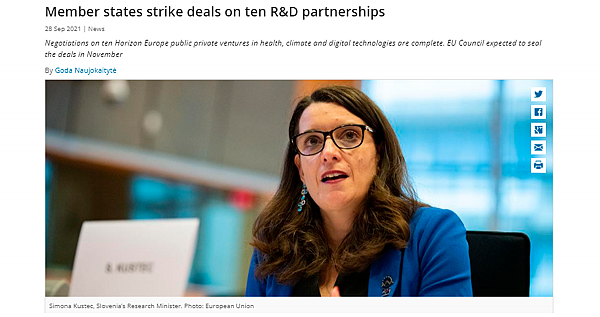Press Member states strike deals on ten R&D partnerships
The negotiations on ten industrial partnerships under Horizon Europe are complete, clearing the way for a December launch of the initiatives, Slovenia’s research minister Simona Kustec told fellow ministers today.
“[The member states] have managed to reach an agreement very fast, which enabled our Slovenian presidency to conclude these negotiations at a very short deadline,” Kustec said.
The partnership legislation has been in the pipeline since the Commission submitted its proposal for the €10 billion package governing nine industrial partnerships as well as one public public partnership on metrology in February.
The main package, final details of which are not yet publicly available, outlines the rules for nine high-profile ventures between the Commission and industry to drive European competitiveness in their respective fields. Two of the partnerships will cover European and African projects and drug development. Three will deal with digital issues: air traffic control, smart networks and electronic components and systems. Another four will cover climate, including green hydrogen, clean aviation, rail networks and bio-based industries. The tenth one, on metrology, is treated as a separate package.
“All these areas require a shared vision on the transformation on processes that are essential to ensuring a sustainable and inclusive recovery. This is why European partnerships are key to enhancing European technological sovereignty,” said Kustec.
The Council is expected to officially adopt the legislation in November, enabling the partnerships to launch their first calls for projects at the start of 2022. Before this, the European Parliament must officially adopt its recommendations for the file, which it expects to do in early October.
Industry is happy the negotiations went smoothly, preventing further delays to the launch of the partnerships.
“In order to reach the EU’s Digital Decade goals we need to get Europe’s research and innovation capabilities up to speed as soon as possible,” said Cecilia Bonefeld-Dahl, director general of DigitalEurope. “Due to delays and the transition from Horizon 2020 to Horizon Europe, 2021 was a sort of “lost year” for companies. They are very much looking forward to participating in the work of the new partnerships, and are ready to ensure that the delays will not jeopardise the development of demonstrators,” she said.
The European Association of Research and Technology Organisations (EARTO) hopes the Council has made it easier for non-profit institutions to participate in the partnerships. The Commission’s original proposal made changes to the way organisations can contribute in-kind to trigger bigger investments from the private sector. However, the changes are likely to make the participation of non-profits, such as research and technology organisations and universities, more difficult, only partially covering their real project costs. “I think we understand what the intention of the Commission was, but it has unintended consequences for non-profit organisations,” said Sophie Viscido, senior adviser at EARTO.
The other new aspect of the partnership legislation is that they will have the responsibility of running all Horizon Europe calls under their respective topics, such as hydrogen, clean aviation or air traffic control. EARTO believes this could have a negative balance of technology readiness levels for those topics, given industry is driven to fund research that will generate commercial returns in the short term.
Here, member states cannot do much to help. “On the partnership side the only thing we can do is to encourage them to have a good balance of stakeholders in their board, because this is how the roadmaps are fed,” said Viscido. “We also hope the Commission will put in place at least a monitoring mechanism to make sure that no gaps are created in the long run and adapt the [Horizon Europe] clusters’ work programmes accordingly, to complement the partnerships when needed.”
Right now, the most important thing is seen as acting at speed. Horizon Europe delays mean the partnerships will launch almost a year after the start of the programme. With global competition growing, “We have to make sure we are doing the research we need in Europe. We are more and more aware that speed is essential,” said Viscido.
To speed up the process, some partnerships are already sharing provisional call dates. The Key Digital Technologies partnership, for example, hopes to launch the first calls as early as December, with the first projects up and running by the end of 2022.
Metrology
The member states today also reached a deal on the partnership on metrology, the science of measurement, in just one round of negotiations with the European Parliament. The only public public initiative of the bunch, the metrology partnership, which brings together the Commission and European metrology institutes, needs approval from the Parliament to start its work.
“This was a very good negotiation, on a very important subject, in which the European Parliament managed to see its position entirely validated,” said Maria da Graça Carvalho, the Parliament’s negotiator for the file. “It is very important that there is market acceptance of metrology innovation, especially in European territory.”
With the deal now struck, the metrology partnership legislation will be officially adopted in November, alongside the nine joint undertakings, and launch in early 2022.
“We have started to prepare,” Jörn Stenger, chair of Euramet, the European alliance of metrology institutes, which represents member states in the partnership, told Science|Business earlier this month. “We have launched informal calls on own risk and own resources, so we’ll be prepared to start projects immediately.”
